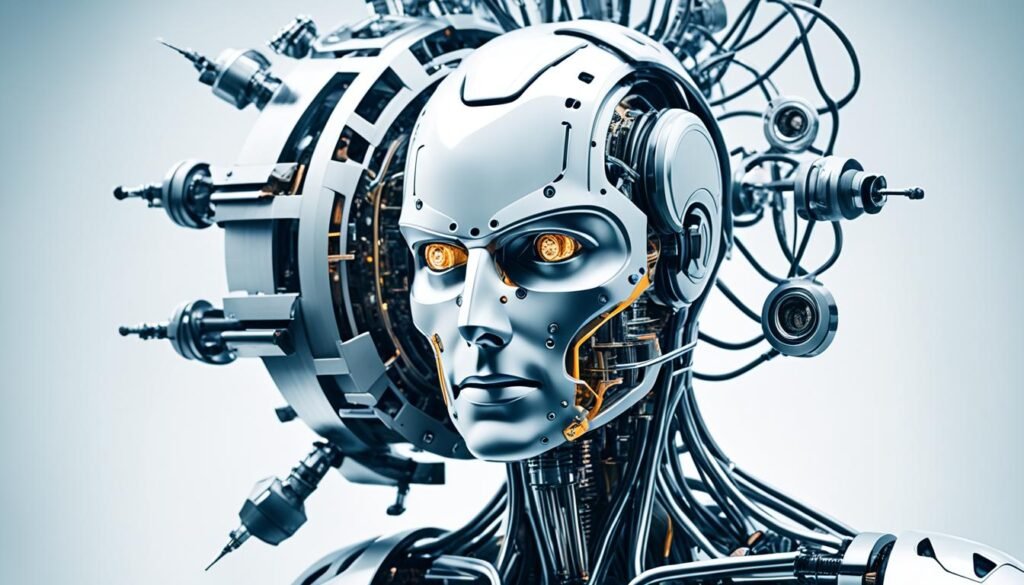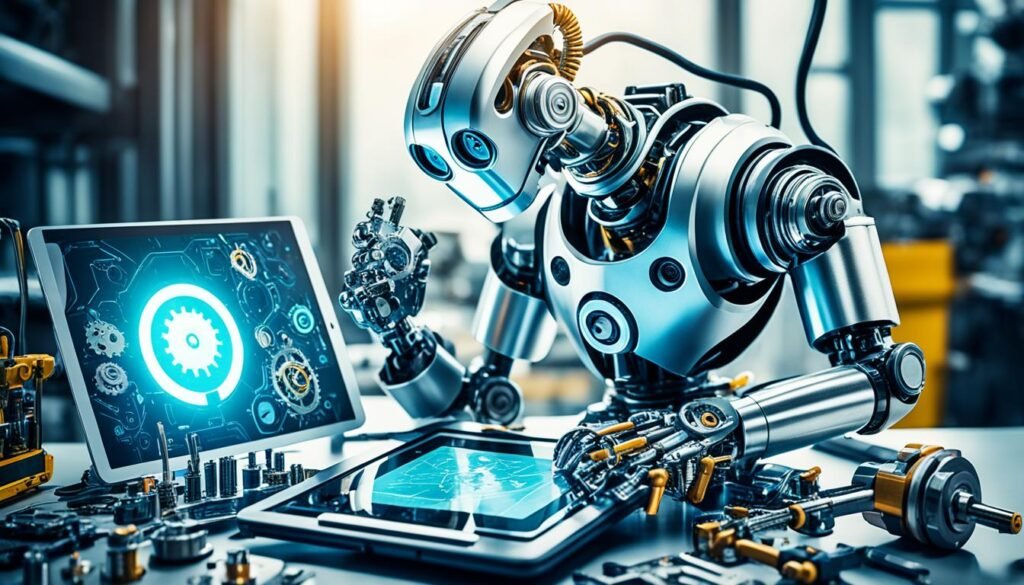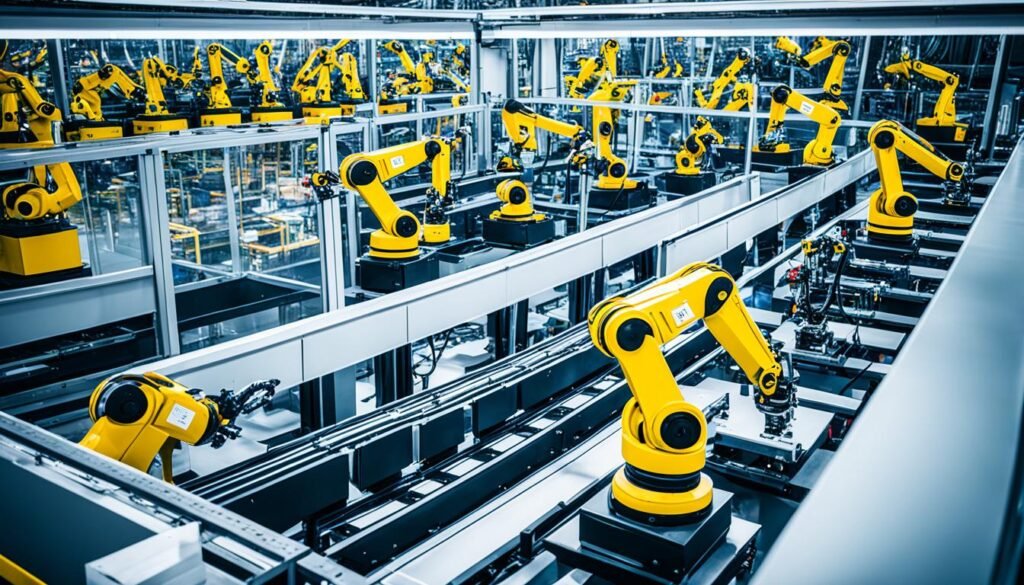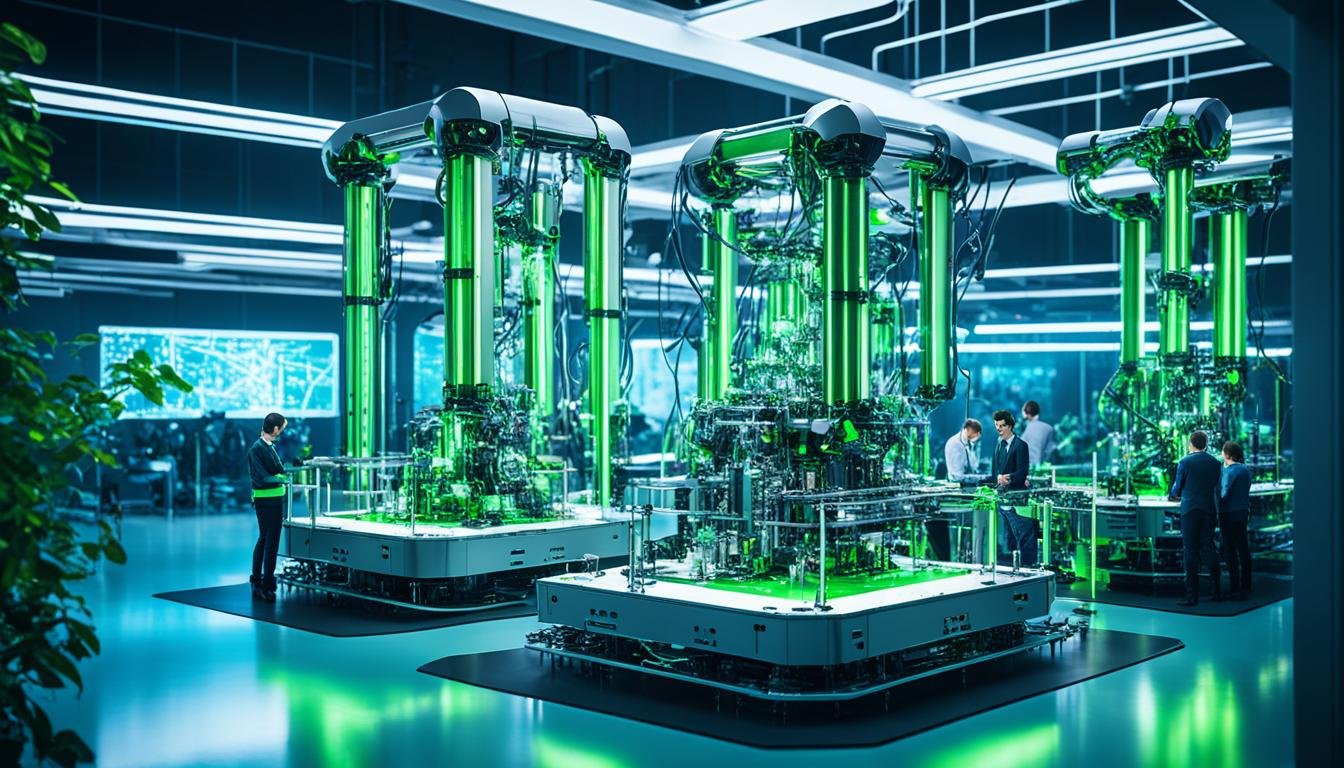In recent years, more students have signed up for advanced courses in artificial intelligence and machine learning. This shows how important AI is becoming in engineering. Mechanical Engineering Professor Levent Burak Kara teaches this course.
AI is changing how engineers tackle tough problems. It offers solutions we couldn’t imagine before. With AI and machine learning, engineers can automate tasks, make designs better, improve simulations, and manage resources better.
AI brings many benefits to engineering. It makes engineers work more efficiently, accurately, and allows them to try out more ideas. This technology is being used in many areas of engineering, like building design and predicting when machines might break down.
This article will show you how AI can solve engineering problems. It will also highlight the exciting new possibilities AI brings to engineering.
Key Takeaways
- AI is revolutionizing the engineering industry, offering solutions to complex problems.
- AI can automate repetitive tasks, optimize designs, enhance simulations, and improve resource management.
- AI is being applied in various engineering domains, including structural analysis, predictive maintenance, and intelligent manufacturing.
- The benefits of AI in engineering include increased productivity, enhanced accuracy, and the ability to explore a wider range of possibilities.
- Engineers can leverage AI to tackle a wide range of engineering challenges and drive innovation in the field.
Intro: Artificial Intelligence in Engineering
Artificial Intelligence (AI) is changing the way engineers work. It helps by doing repetitive tasks automatically. This makes engineers more productive and lets them focus on tough problems.
AI tools also help engineers try out more designs, improve simulations, and make decisions based on data.
Benefits of AI for Engineers
AI is a big help for engineers. It offers many advantages:
- Increased Productivity: AI automates boring tasks. This lets engineers spend more time on creative problem-solving and innovation.
- Enhanced Design Exploration: AI tools simulate and analyze many design options. This helps engineers find the best solutions.
- Data-Driven Decision Making: AI finds insights in big datasets. This helps engineers make decisions based on facts.
- Improved Predictive Maintenance: AI watches over equipment and predicts when they might break. This means less downtime and lower costs.
Overview of AI Applications in Engineering
AI is used in many areas of engineering, like building design and managing resources. Some main ways AI is used include:
- Optimizing designs through AI processing
- Using AI for simulations and analysis
- AI-driven predictive maintenance for equipment and systems
- AI-powered resource management and task scheduling
- AI-assisted prototyping, modeling, and manufacturing processes
By using artificial intelligence, engineers can work more efficiently, accurately, and innovatively. This will shape the future of engineering.
AI-driven Automated Tasks in Engineering
The engineering world is changing fast, thanks to AI. AI is making engineering work better by automating simple tasks. It lets engineers try new things and improve their designs with AI’s help.
Optimizing Designs through Iterative AI Processing
Engineers use AI to make their products better and more efficient. With ai-powered design optimization, they can try many design options. This helps them make their designs better, follow industry rules, and create products that customers love.
Leveraging AI for Simulation and Analysis
AI is also key in engineering simulations and analysis. AI in engineering simulations helps engineers test more accurately and find problems early. This leads to better decisions and outcomes. AI lets engineers test more scenarios, use resources better, and improve their solutions.
As ai for automated engineering tasks becomes more common, engineers will work more efficiently and innovatively. By using AI, the engineering field is set to tackle big challenges and create a better future.

“AI and automation are reshaping the engineering industry, leading to the evolution of traditional tasks and responsibilities. Collaborative robots (cobots) are being integrated into the engineering workforce, assisting in tasks requiring precision and speed.”
can ai solve engineering problems
AI is changing the game in engineering. It’s using machine learning for structural analysis and neural networks for optimization. These tools are solving complex problems faster than ever.
Machine Learning for Structural Analysis
Machine learning is changing how engineers analyze structures. It looks at lots of data to find patterns and predict how structures will behave. This helps engineers make better decisions, improve designs, and keep projects safe and reliable.
Neural Networks for Engineering Optimization
Neural networks are also big news in engineering. They can try out many designs and find the best ones quickly. This is great for making buildings use less energy and for improving how things are made.
AI is a big deal for engineering, and its impact will only get bigger. As AI gets better, engineers will have tools that help them solve tough problems fast and accurately.
| AI Technique | Application in Engineering | Benefits |
|---|---|---|
| Machine Learning | Structural Analysis | Identify patterns, predict behavior, optimize designs |
| Neural Networks | Engineering Optimization | Explore design possibilities, find efficient solutions |
Using AI in engineering shows how technology can do amazing things. As we keep learning about machine learning and neural networks, the future of engineering looks very bright.
AI-Powered Predictive Maintenance
Artificial intelligence (AI) is changing how engineers handle maintenance and spot problems. It uses deep learning to watch complex systems and predict issues early. This AI-powered approach cuts downtime, boosts system reliability, and lowers the chance of expensive failures.
Deep Learning for System Monitoring and Fault Detection
AI tools need lots of data to work well. Machine learning (ML) algorithms are key in predictive maintenance. They look at data, learn from it, and spot important info. This is part of Industry 4.0, where smart factories create big data for AI to use.
AI in maintenance has many perks. It makes production better, supports Total Productive Maintenance (TPM), and helps with Planned Preventative Maintenance (PPM). Using ai for predictive maintenance cuts costs a lot, saving money from fixing things after they break.
Deep learning for engineering fault detection can make machines last longer by fixing problems early. AI-powered predictive maintenance lets companies act fast, saving money, boosting efficiency, and making machines last longer.

“Artificial Intelligence in maintenance can increase productivity by 25% on average. Predictive maintenance using Artificial Intelligence reduces breakdowns by 70%. Maintenance costs are reduced by 25% on average thanks to predictive maintenance systems.”
AI-based predictive maintenance makes the job safer for engineers and techs by checking hard-to-reach spots. It makes maintenance smoother, avoiding unexpected issues. AI-based services adjust maintenance to fit the equipment, skipping unnecessary schedules.
Resource Management with AI
The engineering world is changing fast, thanks to AI. AI is now a key part of managing projects and using resources well. It helps engineers work better and be more efficient.
AI for Task Scheduling and Resource Allocation
AI helps engineers manage tasks and resources better. It uses complex algorithms to plan schedules and use resources well. This means looking at project timelines, team skills, and what equipment is available.
This AI way of managing resources helps engineers solve problems before they happen. It also lets them adjust things in real-time. This keeps projects on track and makes sure resources are used right.
| AI for Engineering Resource Management | AI for Task Scheduling and Resource Allocation |
|---|---|
|
|
Using AI for scheduling tasks and managing resources changes how engineers work. It makes them more productive, cuts costs, and leads to better results. As AI use in engineering grows, we’ll see more new solutions. These will help engineers do amazing things.
AI Tools for Engineers
AI has changed how engineers work. Now, there are many AI tools to help them work better. These tools include deep learning frameworks, coding assistants, and code review tools. They are making a big impact in the engineering world.
Deep Learning Frameworks for Engineering
Deep learning frameworks like PyTorch and TensorFlow lead this change. They let engineers build and train complex models. This opens up new possibilities in predictive modeling and optimization.
Engineers can now solve complex problems more efficiently with these frameworks. They make engineering tasks more precise and effective.
AI Coding Assistants and Code Review Tools
AI coding assistants and code review tools are also changing the game. They help engineers write better code and find mistakes faster. This lets engineers focus more on creating new things and solving problems.
These tools give real-time feedback and suggestions. They make coding easier and improve the quality of engineering work.
Adding AI tools to engineering work is a big step forward. It helps engineers work faster, more accurately, and more creatively. As AI tools for engineers keep getting better, they could change the industry a lot more.
| AI Tool | Key Features | Applications |
|---|---|---|
| TensorFlow | Powerful open-source machine learning framework for building and deploying AI models | Predictive modeling, image recognition, natural language processing, and more |
| PyTorch | Flexible open-source deep learning framework with dynamic computation graphs | Computer vision, natural language processing, and scientific computing |
| Codecov | AI-powered code review tool that provides comprehensive coverage insights and analytics | Automated code reviews, test coverage optimization, and compliance checking |
| Copilot | AI-based coding assistant that suggests code completions and provides contextual assistance | Accelerating coding workflows, improving code quality, and fostering innovation |

“AI tools are transforming the way engineers work, streamlining their workflows and enabling them to focus more on innovation and problem-solving.”
Applications of AI in Engineering Design
AI is changing the game in engineering design. It’s making prototyping and modeling better. Engineers can now create more precise prototypes and explore more design options. This leads to smarter decisions during development.
AI has changed how we predict outcomes in Computer-Aided Engineering (CAE). This means engineers can explore design spaces faster. Before, this took days or weeks. Now, AI helps by speeding up simulations.
Companies like those in the 90s used AI to make cars safer and cut down on warranty claims. This method is now used in many fields. It helps reduce risks.
AI-Assisted Prototyping and Modeling
AI makes designing faster by offering many design options quickly. This not only speeds up the process but also cuts costs. It looks at designs based on how well they work and their cost.
AI and simulation offer insights into how systems will work before making a physical prototype. Machine learning finds the best design settings. AI tools help teams work together by giving real-time advice.
AI use in engineering design has grown a lot in the past five years. This is according to Statista in 2020. From old AI methods to new ones like machine learning, AI is changing design work. It leads to better, cheaper, and more innovative solutions.
| AI Technique | Application in Engineering Design |
|---|---|
| Fuzzy Logic | Handling uncertainty and imprecision in design parameters |
| Genetic Algorithm | Optimization of design configurations |
| Artificial Neural Network | Predictive modeling and simulation of design performance |
| Machine Learning | Automating design exploration and decision-making |
| Deep Learning | Advanced pattern recognition and generative design |
As AI becomes more common in engineering design, we’ll see more innovative and efficient solutions. These will push engineering to new heights.
Intelligent Systems in Manufacturing
The manufacturing world is changing fast, thanks to intelligent systems and artificial intelligence (AI). These new tools are making manufacturing better in many ways. They help make things faster, better, and safer.
Robotics and Automation in Construction
In construction, AI-powered robots and automation are changing how projects get done. They help with everything from surveying sites to moving materials. This makes work go faster, cuts down on mistakes, and keeps workers safer.
Thanks to AI in robotics and construction automation, making complex systems is easier. Companies can use big data to find problems and come up with new solutions. This helps them work better and innovate more.
| Types of AI in Manufacturing | Key Applications |
|---|---|
| Assisted Intelligence | Quality control, product development, procurement |
| Augmented Intelligence | Order management, maintenance, logistics planning |
| Automation | Supply chain management, inventory optimization |
| Autonomous Intelligence | Predictive maintenance, self-healing systems |
More and more, intelligent systems in manufacturing are changing the game. They’re making things more efficient, innovative, and competitive. By using these new technologies, the manufacturing world is ready for a future where AI and automation lead the way.
“Manufacturers are key consumers, developers, and deployers of AI throughout their production processes, leading to more efficient processes, increased sustainability, innovative products, and safer workplaces.”

Applications of AI in Engineering Design
Artificial Intelligence (AI) is changing engineering design. It helps engineers make better prototypes and models. AI tools aid in making smart choices during development. This leads to new and better solutions for users and projects.
AI-Assisted Prototyping and Modeling
AI is key in prototyping and modeling. It simulates complex systems, letting engineers try out many designs. This way, they can spot problems early and save time and money.
Traditional designs often copy what’s already out there. But AI can create new designs that work better. This shows how AI can improve engineering design.
AI also helps with simulations. It gives real-time feedback on designs for things like turbines and heat exchangers. This means engineers can try out many designs quickly, finding the best ones.
As AI becomes more common in engineering, working with AI will be crucial. Humans and AI together can lead to big innovations. This partnership can create designs that go beyond what we thought was possible.
Conclusion
AI is changing how engineers tackle complex problems. It automates repetitive tasks, improves designs, and makes simulations better. This lets engineers work smarter, faster, and more creatively.
As AI gets better, it will help solve more engineering challenges. This could lead to big leaps in the field. For example, AI could make roads safer with self-driving cars or help design better products.
Engineers need to learn about AI and machine learning to keep up. AI will be a key tool for making engineering work better, not replace people. The future of engineering looks bright, with AI leading the way in innovation and problem-solving.
FAQ
Can AI solve engineering problems?
Yes, AI is changing engineering by automating tasks, optimizing designs, and improving simulations. It uses machine learning to solve complex problems better and faster.
What are the benefits of using AI in engineering?
AI makes engineering better by increasing productivity and accuracy. It helps engineers solve complex problems more efficiently. AI also makes simulations more accurate, leading to better decisions and finding problems early.
How is AI being applied in various engineering domains?
AI is used in many engineering areas, like structural analysis and predictive maintenance. It helps monitor systems, predict problems, and manage projects better. AI also changes design by making prototypes more accurate and exploring more design options.
What types of AI tools are available for engineers?
Engineers have many AI tools to help them work better. Tools like PyTorch and TensorFlow help build complex models. AI coding assistants and review tools make writing code easier and more accurate. These tools are changing how engineers work, making them more innovative and focused.
How is AI transforming the manufacturing and construction industries?
AI is changing manufacturing and construction with smarter systems and robots. In manufacturing, AI robots improve efficiency and safety. In construction, AI is making processes like surveying and handling materials better.
